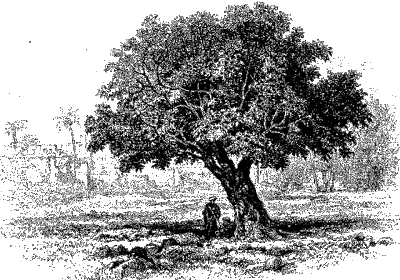Once we had a dog in
our convent who found joy in chewing or destroying things. He would chew
slippers of priests, tear upholsteries of couches, and know many ways to damage
precious stuff. When we are away, he is in a search-and-destroy mission. When
brothers confront him, he would bow and turn away his head from the brother
scolding him. Often, he would run away and go in hiding to evade the sermon he
is about to receive. He knew he sinned, but would not admit it, and would even
deny it, and run away from the responsibility his sins incurred. Dogs reaction
on the offenses they make is not far from our reaction on the sins we
committed. Sin brings forth shame as it is something shameful. Remember how
Adam and Eve hid from God in the garden of Eden?
In the gospel
(Jn1:45-51), Nathaniel was under a fig tree. St. Augustine comments on the
meaning of the fig tree: We read of one fig tree which was cursed because it
had only leaves and no fruit. Again, at the creation, Adam and Eve, after
sinning, made themselves aprons of fig leaves. Figleaves then signify sins; and
Nathanael, when he was under the fig tree, was under the shadow of death.
Under
the fig tree, there was doubt and hesitation in Nathaniel. Sin hinders him from
going to the Lord. So it is with our sinfulness. Sin puts us under the shade of
darkness. Its darkness disables us to see ourselves as Christ sees us. Sin
distance us from Christ; from the light. Sin fails us to realize our real
worth. Under the shade of sin, we doubt whether God will forgive us. We
question the immensity of God’s mercy for us. Sadly, sometimes, we enjoy being
in darkness, thinking this is the best situation we can be. And we continue
sinning in darkness. Notice, most sins are committing in darkness, in
isolation, away from the presence of others who may admonish us in the first
instance we attempt to sin. So, we sin, thinking no one sees us, but Christ
says; I see you under the fig tree.
The words of Philip to
Nathaniel can be the words of God to us too: Come and See. We can only see in
the presence of light. Without light in our eyes, we cannot see. Without light
around us, we cannot see. There is no light for a blind. Thus, being in the
light is surely far better than in darkness replete with deceptions and
make-beliefs. We can only truly see ourselves in the presence of the Light. In
the light, out of the shade of sin, we can be true to ourselves; we can see
ourselves without pretensions, devoid of fear and shame. We can be the way
Christ sees us. More than becoming the object of our sight, God wants us to see
Him, eye to eye, that we may be able to see our real worth through our
reflection in the eyes of God. As we approach Jesus, we come to know our true
value, as men and women of grace more than sin; as persons forgiven by God and
beloved by God. This is our worth and value. This is how God sees us.
Before we SEE, we have
to step out of the shade of sin that keeps us in darkness. We have first to
answer God’s invitation, COME, come into the light, come into God’s presence.
And we shall see.
Can you SEE? If not,
you might need to step out from the darkness and into the Light!




No comments:
Post a Comment